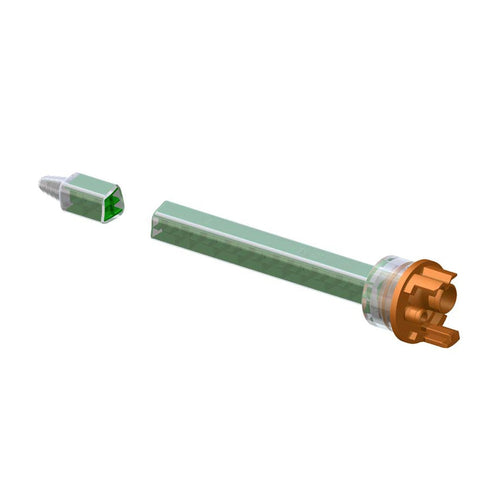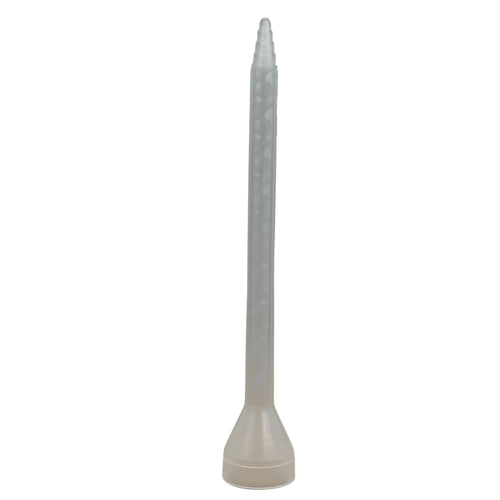Updated July 9, 2025
Static mixers are used to mix two materials into one flowing, homogeneous adhesive material. These mixers provide a much greater degree of control when mixing and dispensing materials. In turn, this control can lead to less wasted material to save you money on both production and material costs.
That being said, choosing a disposable mixer nozzle is not always easy. Picking the right static mixer can make all the difference when it comes to production value and durability. The wrong mixer can lead to improperly mixed materials, slow set times, and a bad finished product. But there are thousands of different mixers with various lengths, styles, elements, and more. So how do you choose?
6 Questions to Determine Which Static Mixer Nozzle to Choose
To help you narrow down your choices from our large selection, we recommend you start by answering these five questions regarding each specific feature of the mixer you need. Ultimately, the answers to these questions can help you pick a glue mixing nozzle that is best for your specific needs.
1. What is the dispensing method?
The dispensing method is a big factor in determining which static mixer nozzle will work best for you. The materials you are using will help to determine your mixer based on the pressure limitation of the nozzle, the acceptable back-pressure/retained volume, and the expected, or desired flow rate.
Cartridge applications automatically limit the volume you can work with, so retained volume will play an important role in your determination. This means you will also need to be comfortable handling back-pressure, unless you are using a pneumatic dispenser where is less of an issue. Meter mix machine applications can be used when mixing larger amounts of material. This also makes retained volume less of an issue owing to the larger size of the mixer.
See our most popular 50mL bayonet static mixer and meter mix machine static mixer.
2. What materials are you trying to mix?
The materials you are mixing directly determine the range of elements needed to mix the materials into a homogeneous material. Some materials are considerably more difficult to mix than others, so it is crucial that you have the appropriate amount of elements in your mixer to get the mix you need.
Some common materials you will likely be working with include acrylic, epoxy, polysulfide, PU foam, silicone, and urethane. Typically, the element range needed for each of these separate materials is as follows:
|
Material |
Range of Elements |
|
Acrylic |
8-20 elements |
|
Epoxy |
15-24 elements |
|
Polysulfide |
24-32 elements |
|
PU Foam |
10-24 elements |
|
Silicone |
20-30 elements |
|
Urethane |
24-36 elements |
You also need to consider the material ratio. A close mix ratio of 1:1, you typically need a lower number of elements. On the other end of the spectrum is a wide mix ratio like 10:1. In this case, you would need a higher number of elements such as in a specialty nozzle from the Sulzer MFHX series, to achieve a pure, homogenous mix.
3. What is the viscosity of the materials being mixed, and what flow rate would you like to achieve?
When picking a static mixing nozzle, you should also consider the viscosity. Knowing the viscosity of the materials helps you determine the number of elements you need as well as the diameter of the elements. If the two components have very different viscosities (ie. material A is 5,000cps and material B is 150,000cps), you will likely need to use a higher number of elements.
In terms of diameter, the thinner the materials you are working with, the smaller the diameter is required in order to get a proper mix. That being said, thicker materials require a larger diameter to achieve the same degree of homogeneous mixing. There are also applications that require a very small amount of adhesive, and we offer a collection of glue needles that you can add to get these precise amounts.
Follow the chart below to determine the diameter range of the static mixer nozzle you will need.
|
Viscosity Range |
Mixing Element Diameter Range |
|
Thin (< 5,000cps) |
0.093” – 0.25” (2.36 – 6.35mm) |
|
Medium (5,000 – 50,000cps) |
0.212” – 0.314 (5.4 – 8mm) |
|
Thick (>50,000cps) |
>0.366” (9.3mm) |
4. What will you attach the mixer to?
This question will help you determine what connection style/inlet you will use with your mixer. There are three main connection types: bayonet, bell, and integral nut (threaded). Bayonet mixers feature a simple twist-and-lock system and are recommended for 9-50mL cartridges. Bell mixers come in a slightly larger variety with options for round, square, and rotary connections. Typically bell mixers are used for 200mL cartridges or larger. Inline, or threaded mixers, are also for larger cartridge sizes, but they do not require the use of a retaining nut.
5. How, or into what, do you want to apply the material?
Another factor to consider when choosing a disposable static mixer is your purpose or application.
*Please note, if you are not using a cartridge application, this question is irrelevant. You can use the chart below to help you determine the appropriate mixer outlet needed for your project.
|
Material Application |
Mixer Outlet |
|
Increase onsite output |
Stepped Outlet (for 8mm, 3/8”, or ½” bell mixers) |
|
Small bead |
Slip Luer Outlet (for 3/16”, 1/4” bell and bayonet mixers) |
|
Spread out w/ Pro-Tip accessories |
A Detail Outlet (for specific bead outlet-end can be snapped off) |
|
Precise Placement w/ needle-tip accessories |
Luer Lok, or Rotating Luer Lok Outlet (for precise placement when using a needle-tip) |
|
Hole extension |
Extension Outlet (for reaching through holes (ie. anchoring)) |
|
Maximum output |
Full Bore Outlet (for maximum material output) |
|
Through tubing at end of mixer |
Barbed Outlet (for attaching tubing at end of mixer) |
|
Precise placement w/ needle tip and jacket |
H-tapered, or Snap Hub Outlet |
6. What is my budget?
The final question to ask when determining which mixer nozzle to choose is what your budget is. While niche applications may have more limited options, there are often multiple manufacturers that make nozzles with the same specifications. Generic static mixing nozzles may provide you with an almost identical nozzle for a fraction of the cost. You can shop our collection of generic options with our static mixing nozzles from Infinity Bond.
Need More Help?
At Gluegun.com, we offer an extensive selection of disposable static mixers to choose from. If you're not sure which static mixing nozzle to pick, contact us, and we can help guide you through this process.














